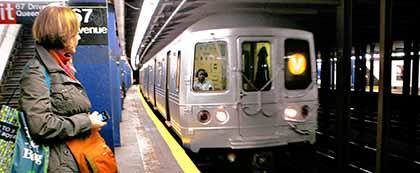By Philip Newman
State Comptroller Thomas DiNapoli says the MTA has greatly improved security since the attack on the World Trade Center, but the subway and bus systems are still vulnerable.
“The capital security program the MTA has implemented since 9/11 has made New Yorkers more secure,” DiNapoli said. “The MTA has made progress, particularly in the last two years. But the mass transit system is still inherently vulnerable. Individual projects in this program are months, if not years, behind schedule and well over budget and additional capital improvements are needed.”
For its part, the Metropolitan Transportation Authority said “the report acknowledges the significant progress the MTA has made over the past two years.”
“We have added more than 1,400 security cameras over the past year alone, bringing our total to more than 3,700 throughout the system with close to 600 feeding directly into the NYPD command center,” the MTA said. “We have increased the number of security personnel, hardened our system and work remains on track to complete remaining projects within the current budget. While you cannot put a price tag on the safety and security of our customers, we continue to identify cost savings within our capital program.”
The comptroller’s report said projects in the MTA’s capital security program “target the system’s most vulnerable and heavily used assets, including stations, transit hubs, bridges and tunnels.”
But the comptroller said the security improvements in this phase will not be completed until June 2012 — nearly four years later than the original completion date of September 2008.
“After more than nine years, the MTA has completed 11 of the original 16 security projects as well as elements of the five remaining projects,” he said.
The report said that as of December 2010, the MTA had completed 31 of 38 planned construction tasks and the remaining seven tasks were in the process of construction, although more than 60 percent were behind schedule, including 11 that were behind by more than a year with five tasks more than 30 months late.
“Electronic security projects in particular have encountered significant problems,” DiNapoli said.
The cost of this program has nearly doubled, growing from $285 million to $515 million. The MTA has continued work on the electronic security program by hiring other contractors, but full implementation is not scheduled to be completed until June 2011.
A lawsuit between the MTA and Lockheed Martin, the original contractor for the electronic security program, is ongoing.
Reach contributing writer Philip Newman by e-mail at timesledgernews@cnglocal.com or phone at 718-260-4536.



































